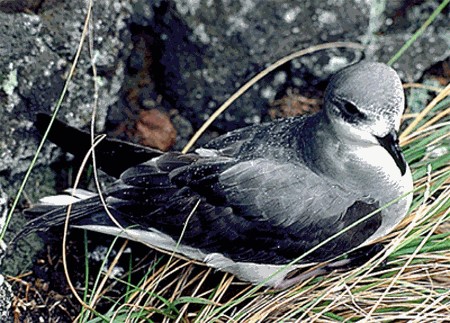
Black-winged Petrel ashore
Terence O’Dwyer (Conservation and Restoration Science, Department of Planning and Environment, New South Wales, Australia) and colleagues have published in the journal Bird Conservation International on breeding recovery of the Black-winged Petrel Pterodroma nigripennis on Australia’s World Heritage Lord Howe Island after the removal of introduced Ship or Black Rats Rattus rattus.
The paper’s abstract follows:
“In 2019, a Rodent Eradication Project (REP) was implemented on World Heritage listed Lord Howe Island, Australia. Among the species expected to benefit was a burrow-nesting seabird, the Black-winged Petrel Pterodroma nigripennis. Prior to the REP, we assessed causes of Black-winged Petrel nest failure using surveillance cameras. We also measured breeding success before and after the REP and investigated emerging pressures on breeding success from other native species. In 2017, ship rats Rattus rattus were a major cause of Black-winged Petrel nest failure, and breeding success was as low as 2.5%, compared to 47.5% on rodent-free Phillip Island (Norfolk Island Group). In 2020, in the absence of rodents, breeding success on Lord Howe Island increased dramatically to 67% and remained high (50%) in 2021. This result suggests that reproductive output of small seabirds has been heavily supressed by rodents on Lord Howe Island for decades. A subsequent increase in the population of a predatory endemic rail, the Lord Howe Woodhen Hypotaenida sylvestris, combined with burrow competition from Little Shearwaters Puffinus assimilis, indicated that initial high breeding success may not be sustained. However, the surge in successful breeding of Black-winged Petrels is likely to result in a significant increase in fledgling numbers and the recruitment of hundreds of additional birds each year. Given the important role of petrels in global nutrient cycling, and their positive influence on island biodiversity, their expansion should benefit the ecological restoration of Lord Howe Island.”
With thanks to Sandy Bartle.
Reference:
O’Dwyer, T., Carlile, N., O’Neill, L & Halpin, LR 2022. Changing fortunes of the Black-winged Petrel Pterodroma nigripennis following the Lord Howe Island Rodent Eradication Project - interactions with other recovering species. Bird Conservation International doi.org/10.1017/S0959270922000132.
John Cooper, ACAP News Correspondent, 30 August 2022

 English
English  Français
Français  Español
Español